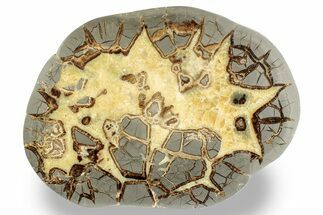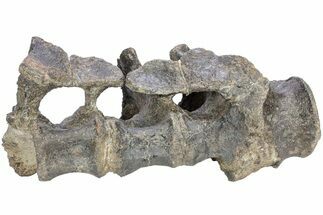This Specimen has been sold.
13.7" Petrified Tree Fern (Tietea) End-Cut - Brazil
This is a large and beautiful, 13.7" wide end-cut of Permian-aged petrified wood from the tree fern, Tietea singularis. The inner wood detail is very fascinating and displays a variety of colors. It comes from the Araguania petrified forest of Brazil and there is only one legal mining claim in the region. It has been cut flat and nicely polished to a glossy finish along one end to display the very interesting, fossilized internal structure of the plant.
Comes with a display stand.
Comes with a display stand.
What Is Petrified Wood
Petrified wood is the name given to wood that has been turned into stone (fossilized) through the process of permineralization. In this process, all of the organic matter becomes replaced by minerals, while much of the original structure, such as tree rings, is retained. For this to happen, the wood needs to be buried in an environment low in oxygen to prevent decomposition and with flowing, mineral-laden water, so minerals may replace structures. The coloration is caused by various minerals that present in that water during fossilization. For example, red colors are due to iron compounds, greens due to copper, and so on.
Petrified wood is the name given to wood that has been turned into stone (fossilized) through the process of permineralization. In this process, all of the organic matter becomes replaced by minerals, while much of the original structure, such as tree rings, is retained. For this to happen, the wood needs to be buried in an environment low in oxygen to prevent decomposition and with flowing, mineral-laden water, so minerals may replace structures. The coloration is caused by various minerals that present in that water during fossilization. For example, red colors are due to iron compounds, greens due to copper, and so on.
SPECIES
Tietea singularis
AGE
LOCATION
Filadélfia County, Tocantins, Brazil
FORMATION
Motuca Formation
SIZE
13.7 x 7.7", up to 2.3" thick
CATEGORY
SUB CATEGORY
ITEM
#281924
We guarantee the authenticity of all of our specimens.
 Reviews
Reviews












